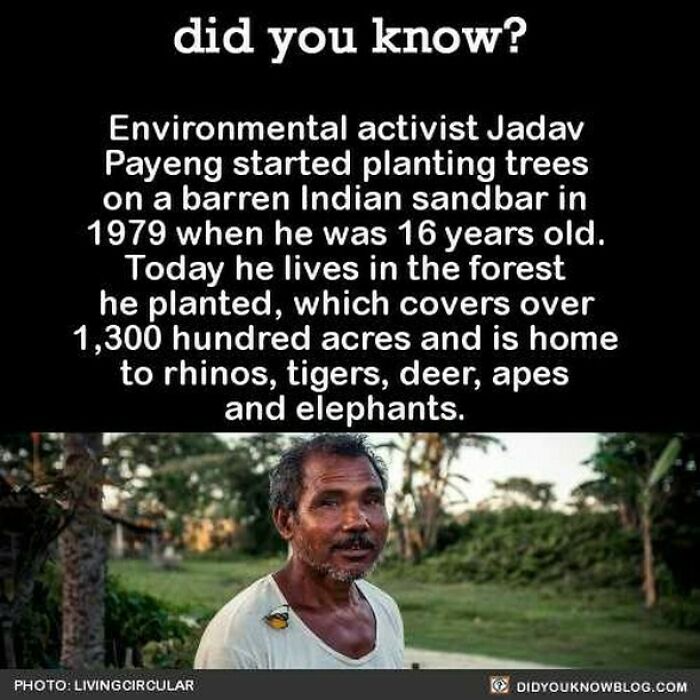It won’t hold our attention if it’s not educational or amusing. Many of us still have an inner child whose eyes are always looking for something fun or interesting, whether it is online or in real life. There is a deep desire to learn more about the world and we are driven by curiosity. As we age, it can get dimmer, but it never goes away. Snacking on cool, bite-sized facts about science, psychology, tech, and history is one way to reignite our passion for learning.
That is where the hugely successful ‘Did You Know?’ project comes in. It is run by a group of people who are knowledgeable about the world. To help spread their mission of enriching people’s lives through education, we’re featuring some of the best posts on their IG page.
Let us know which of the facts you found the most surprising in the comments. If you feel like you have fallen in love with the project, be sure to follow them on social media for their latest updates.
1.

A person is a part of the ‘Did You Know?’. The team told that they started the project in 2011. Even if we’re talking about the past, present, or future, the goal was to make it fun and interesting to learn new things.
Specifically, we know if we can take something complex or long but filter it down to something snackable we have accomplished our goal,” they said.
“It might sound cheesy, but we want to make learning fun,” the ‘Did You Know?’ team representative told that, above everything, they put an emphasis on this key thing.
2.

3.

They showed a bit of their approach to the research behind each fact.
“We focus heavily on the research and fact-checking when creating our content and hold high standards to finding and verifying sources,” they explained. “No one is perfect, but we have reviews by writers, editors, and publishers before we publish to ensure we are doing our best to not misinform our readers.”
Steven, from the Omni Calculator project, shared his thoughts about how scientists should act if they come across differing interpretations of the truth.
“Probably the main factor when deciding on which theory is closer to the truth is the amount and quality of the evidence for each interpretation,” he told us, adding that scientists have to put in the work and immerse themselves in their field. Staying up to date with the newest information and findings is critical.
“You have to be prepared to keep up with the developments in a contested field of science, as new evidence may favor one or the other over time. And therefore, you need to keep an open mind in these areas.”
4.

5.

6.

We wanted to get Steven’s opinion on how to deal with failure, something that most people don’t like. Many people feel embarrassed and miss the lesson when they make mistakes. Some people shy away from failure because they think it’s trial and error.
“One very powerful way of learning a new skill is by trial and error. Take learning to ride a bike for example. We fall many times and make numerous mistakes before we finally get it and we can ride error-free. So the next time you make a mistake, reframe it as part of the trial and error learning process and normal part of it,” the member of the Institute of Physics in the UK told.
Steven suggests taking a look at what’s new and fresh in your chosen subject as a way to keep our passion for our beloved subjects burning bright over the years and ups and downs. It’s bound to reignite any interest you may have lost.
“One good way is to keep up with the latest news happening in your subject area. You will be exposed to all the new developments and realize that the subject is progressing past what you know and learn new things,” he said.
7.

8.

9.

The team behind the ‘Did You Know?’ project states that their main purpose is to “enrich the lives of others by providing fun and interesting ways to learn about the world —past, present, and future—what lies within it, and what’s been discovered beyond it.”
They say that they give new ways of observing and understanding life in the massive stream of information that many of us have access to at our fingertips.
Quality, reliability, and excellence are what the team strives for. They do a lot of research to make sure that what they share is accurate.
“We know you want more than just random, meaningless facts, so we work very hard to live up to your expectations. Whether you’re interested in giant tarantulas who have tiny-froggy pets, lifelong couples who die holding hands, everyday people striving for social justice, the fact that magenta doesn’t exist, or the reason why your diamond engagement ring is the result of a decades-old marketing ploy and holds no actual monetary value, ‘did you know?’ has something for everyone,” the team writes that they try to provide something interesting for everyone, no matter who they are.
No, really, they’re aiming to make everyone happy: “the knowledge junkies, the trivia addicts, the know-it-alls, the need-to-know-mores, the don’t-know-enough, the young, the old, the incorrigible, the bored, the eager, the downtrodden, the underdogs, the lovers, the dreamers, and you.” They should show that everyone is a fan of something. No matter what kind of person you are.
10.

11.

12.

13.

14.

15.

16.

17.

18.

19.

The Associated Press, The New York Times, and Reuters are some of the most trustworthy sources, according to Mike. “They employ fact-checkers and editors that ensure the information they post is correct. They’re basically doing the research and homework for you. There are literally too many online sources to list that can’t be trusted and should be avoided. Anyone can basically post anything they want… proceed with caution,” he told.
20.










